THE RUSKIN CROWD - Pitt Med - University of Pittsburgh
THE RUSKIN CROWD - Pitt Med - University of Pittsburgh
THE RUSKIN CROWD - Pitt Med - University of Pittsburgh
You also want an ePaper? Increase the reach of your titles
YUMPU automatically turns print PDFs into web optimized ePapers that Google loves.
In September 1970, Bill Cleveland<br />
(MD ’74) gassed up his yellow<br />
Volkswagen Beetle and left Atlanta<br />
for <strong>Pitt</strong>sburgh. It was 700 unairconditioned<br />
miles in the summer heat—the sort <strong>of</strong> epic<br />
road trip that gives a young man at a pivotal<br />
moment in his life plenty <strong>of</strong> time to<br />
second-guess his choices.<br />
But not Cleveland. He’d done his<br />
homework. There was no doubt in his<br />
mind that he’d chosen well when he chose<br />
the <strong>University</strong> <strong>of</strong> <strong>Pitt</strong>sburgh School <strong>of</strong><br />
<strong>Med</strong>icine.<br />
That year, medical schools across the<br />
country had made unprecedented efforts to<br />
diversify enrollment. Cleveland and several<br />
<strong>of</strong> his classmates at Morehouse College,<br />
a college for African American men, had<br />
been <strong>of</strong>fered scholarships from schools<br />
across the country. But to their disappointment,<br />
when they went for their interviews,<br />
most <strong>of</strong> these programs had confessed they<br />
were accepting only one or two African<br />
American students that year.<br />
clique-ish campus life the Morehouse graduates<br />
knew back in Atlanta.<br />
“We’d just say, ‘We’re from <strong>Pitt</strong>,’ and<br />
they’d welcome us in,” he recalls.<br />
For the next several years, African American<br />
med students from Morehouse and elsewhere<br />
built a community <strong>of</strong> friends and neighbors in<br />
Ruskin Apartments, now Ruskin Hall. (It was<br />
difficult to find Oakland landlords eager to<br />
accept Black student as tenants, some recall.)<br />
They walked to and from class and work<br />
together, commiserated over the rigors <strong>of</strong> their<br />
training, bonded in ways you can only do by<br />
poring over physiology notes together for 12<br />
hours at a stretch. They built what remain<br />
some <strong>of</strong> the closest and most lasting friendships<br />
<strong>of</strong> their lives.<br />
Cleveland says he and his old friends didn’t<br />
want for much during med school, but they<br />
agree one key ingredient was missing: There<br />
were few Black mentors at <strong>Pitt</strong>—no strong<br />
role models with whom they could identify,<br />
no blueprints for the future.<br />
So, at the group’s most recent reunion,<br />
like being 6-foot-1 and playing in the NBA. It<br />
doesn’t mean you can’t do it; it means you have<br />
to bring something else to your game.”<br />
“There’s something about cancer that<br />
negates a lot <strong>of</strong> that,” said oncologist Bill<br />
Hicks (MD ’74), a pr<strong>of</strong>essor <strong>of</strong> medicine at<br />
Ohio State <strong>University</strong>. “If people think you<br />
might be able to help them, they don’t care<br />
what color you are.”<br />
The group chatted into the night, the<br />
elders sharing advice like caring uncles. Topics<br />
ran the gamut. Jackson Wright—the first<br />
African American to earn both an MD and a<br />
PhD at the School <strong>of</strong> <strong>Med</strong>icine (MD ’76, PhD<br />
’77)—urged the students to consider the academic<br />
path. (He himself is now a pr<strong>of</strong>essor <strong>of</strong><br />
medicine at Case Western Reserve <strong>University</strong>.)<br />
Moore warned against the temptation to pick<br />
a specialty based on compensation rather than<br />
passion. Everett Cantrell (MD ’74) stressed<br />
the importance <strong>of</strong> business training; that subject<br />
came up several times.<br />
“I was the first person in my family to<br />
graduate from college and then to go to gradu-<br />
“We’d just say, ‘We’re from <strong>Pitt</strong>,’ and they’d welcome us in,” he recalls.<br />
COURTESY WILLIAM CLEVELAND<br />
“We were concerned that that would<br />
be a socially isolating and uncomfortable<br />
learning environment—not a good way to<br />
live four years <strong>of</strong> your life,” says Cleveland.<br />
<strong>Pitt</strong>, on the other hand, admitted more<br />
than 10 African American med students in<br />
1970 alone. “We realized we could come as<br />
a group and help one another through it.”<br />
<strong>Pitt</strong>sburgh had the feel <strong>of</strong> both<br />
Midwestern hospitality and Northeastern<br />
urbanity. At that time, Black and White<br />
hospital employees didn’t tend to socialize<br />
<strong>of</strong>f the clock, yet the work environment was<br />
courteous and respectful.<br />
What little socializing the Morehouse<br />
group managed during those busy years<br />
didn’t disappoint, though.<br />
On the heels <strong>of</strong> 1960s unrest, Oakland<br />
saw a new era <strong>of</strong> Black student awareness<br />
and awakening. Friday and Saturday<br />
nights, Cleveland and his friends went to<br />
African American student parties—including<br />
a few they weren’t invited to—and their<br />
warm reception was a far cry from the <strong>of</strong>ten<br />
which was organized by Cleveland, they<br />
<strong>of</strong>fered themselves as mentors to a new crop<br />
<strong>of</strong> young people. On a breezy Friday night<br />
in June, the alums checked into Nemacolin<br />
Woodlands Resort & Spa in Farmington, Pa.,<br />
65 miles from their old stomping grounds,<br />
and welcomed a group <strong>of</strong> African American<br />
med students enrolled at <strong>Pitt</strong> to join them for<br />
dinner. Their discussion was videorecorded<br />
for student use by the Office <strong>of</strong> Diversity<br />
Programs.<br />
“I’m looking at some <strong>of</strong> the graduation<br />
years on your name tags,” said second-year<br />
student Alex Singleton on the night <strong>of</strong> the<br />
event. “Keeping in mind that we know we’re<br />
not fellow travelers in terms <strong>of</strong> how society<br />
might respond to African American doctors,<br />
what are some <strong>of</strong> the challenges that you experienced<br />
when you first got into medicine that<br />
might still persist to this day, that we need to<br />
be aware <strong>of</strong>?”<br />
“Probably 90 percent <strong>of</strong> my practice was<br />
White,” said William David Moore (MD<br />
’74). “There was prejudice, but it was sort <strong>of</strong><br />
ate school,” said Diamond Harris, a third-year<br />
student. “I was wondering: How prepared did<br />
you all feel? How did you adjust?”<br />
“For those <strong>of</strong> us who come from a disadvantaged<br />
background and have no idea what<br />
the business world is like,” said Moore, “having<br />
been singularly focused on becoming a<br />
physician leaves you a babe in the woods for<br />
people who are skilled at taking advantage <strong>of</strong><br />
you. If you can’t find a way to make it work<br />
financially, nothing else will matter. You have<br />
to manage the business aspect <strong>of</strong> it.<br />
“Just don’t lose sight <strong>of</strong> the heart <strong>of</strong> it—the<br />
giving back,” he continued. “What’s most<br />
rewarding about medicine, I think, is one person<br />
taking care <strong>of</strong> another—or teaching one<br />
person to take care <strong>of</strong> another.”<br />
In that spirit <strong>of</strong> generosity, the alumni<br />
encouraged the students to stay in contact<br />
with them.<br />
The gathering harkened back to those<br />
Friday nights 40 years ago, when a group <strong>of</strong><br />
<strong>Pitt</strong> students would show up at a party full <strong>of</strong><br />
total strangers and be welcomed inside. ■<br />
WINTER 2009⁄10 33


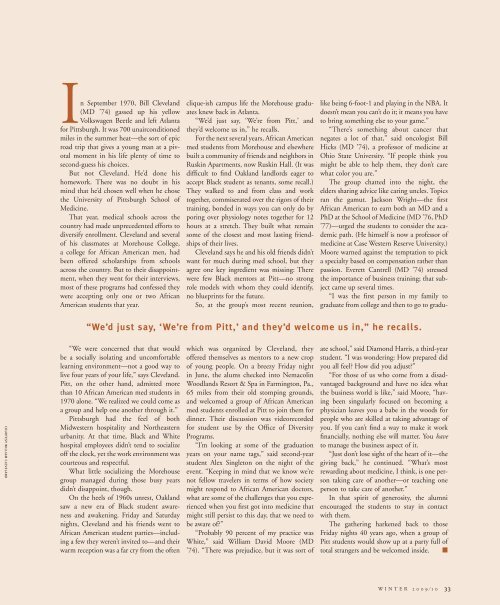
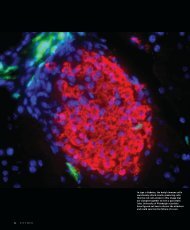
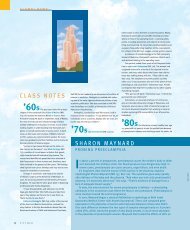
![entire issue [pdf 2.79 mb] - Pitt Med - University of Pittsburgh](https://img.yumpu.com/50435398/1/190x231/entire-issue-pdf-279-mb-pitt-med-university-of-pittsburgh.jpg?quality=85)
![entire issue [pdf 6.47 mb] - Pitt Med - University of Pittsburgh](https://img.yumpu.com/50360689/1/190x231/entire-issue-pdf-647-mb-pitt-med-university-of-pittsburgh.jpg?quality=85)
![entire issue [pdf 12.7 mb] - Pitt Med - University of Pittsburgh](https://img.yumpu.com/49831615/1/190x231/entire-issue-pdf-127-mb-pitt-med-university-of-pittsburgh.jpg?quality=85)
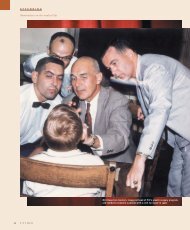
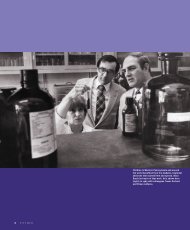
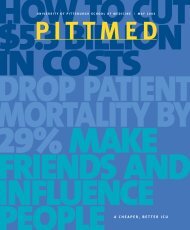
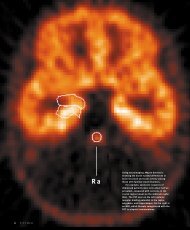
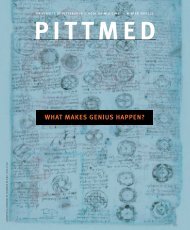


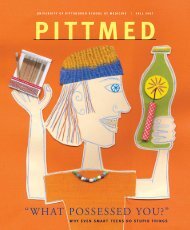
![entire issue [pdf 11.3 mb] - Pitt Med - University of Pittsburgh](https://img.yumpu.com/46685830/1/190x231/entire-issue-pdf-113-mb-pitt-med-university-of-pittsburgh.jpg?quality=85)
![entire issue [pdf 12.7 mb] - Pitt Med - University of Pittsburgh](https://img.yumpu.com/44997419/1/190x231/entire-issue-pdf-127-mb-pitt-med-university-of-pittsburgh.jpg?quality=85)